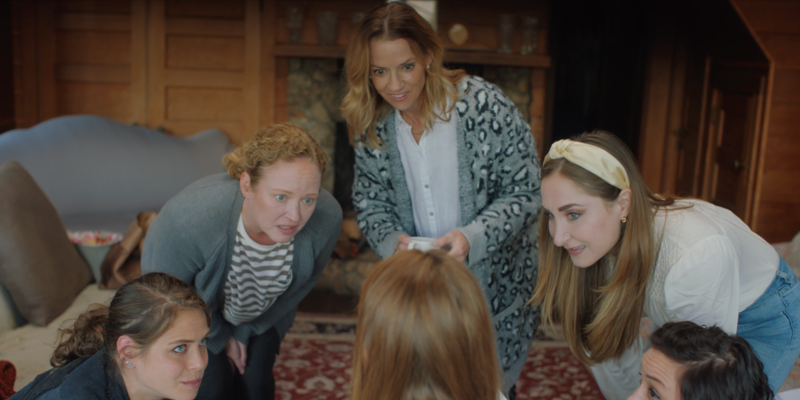
Review by
Eric Hillis
Directed by: Beth de Araujo
Starring: Stefanie Estes, Olivia Luccardi, Eleanore Pienta, Dana Millican, Melissa
Paulo, Jon Beavers, Cissy Ly
Judging by American movies, you would think all racists were illiterate
working class redneck men. American cinema likes to portray racists in
such a cartoonish manner so as not to offend white people. "I'm nothing
like that guy," such movies allow well-educated, middle class white
people to reassure themselves. How refreshing then to get a movie in
which the racists aren't a group of burly, bearded hicks with
Confederate flag tattoos but rather a group of (mostly) well-groomed,
well educated women who might be mistaken for your typical soccer
moms.
That's how writer/director Beth de Araujo presents the villains
of her intense thriller Soft & Quiet. "The media like to paint us as these, like, big scary monsters," one
of her antagonists says of her white supremacist kin, but with a name
like De Araujo, I'm guessing this filmmaker knows that the main threat
to minorities comes not from the powerless working class but from the
middle classes. From people like Emily (Stefanie Estes), a
well-spoken and well-presented kindergarten teacher with the looks of a
model.

When we meet Emily first she's carrying a tinfoil covered pie to a
meeting of similar women held in a spare room of a small church. When
she removes the foil we see she has cut a swastika into the crust. It's
an early sign that like so many people that fall into such movements,
Emily isn't fully committed, as no true Nazi would disrespect their
iconography in such a manner. Unable to get pregnant, Emily seems to
have developed a need to lash out at someone, and as she's not the sort
of person to blame her God, she's picked those who don’t look like
her.
Emily is joined by a few women much like her, well off small
businesswomen whose concerns range from their worries at how "the Jews"
control the media and the banks to how annoying they find the "coloured
kids" who frequent their shops. There are also a couple of working class
women who stick out among Emily and her friends. Leslie (Olivia Luccardi) is an ex-con converted to the Aryan cause by her cellmates, while
Marjorie (Eleanore Pienta) is a minimum wage worker who blames
her financial woes on diversity initiatives. Aside from the hateful
rhetoric, the meeting goes like any other get-together between a group
of women. This could be a book club, if the book were Mein Kampf.

Things escalate when the group is kicked out by a priest who overhears
their talk. Stopping off at one of their shops to pick up some wine,
they get into an argument with a pair of immigrant women, one of whom
was the rape victim of Emily's incarcerated brother. The women decide to
play a "practical joke" by breaking into the home of these women, and
that's where things take a turn towards violence.
De Araujo opens her movie in a manner that might lead you to believe
it's a satire. The gripes of this bunch of harpies are so clichéd that
it's impossible not to laugh. But by the movie's second act it's no
laughing matter as the film takes a turn into grindhouse territory. Like
a gender reversal of the infamous video nasty
Fight for Your Life, Soft & Quiet puts the viewer in the uncomfortable
position of watching some of the most loathsome people imaginable act
out with ruthless cruelty. The movie's second act is as intense a
viewing experience as you could imagine, and I suspect it may be too
much for some viewers to endure.

The movie is shot as though filmed in one unbroken take. Early on it
feels like a gimmick, as there are some moments where the camera is
simply following a character from point A to point B where a cut might
have sufficed. But what De Araujo's real time filmmaking does is
reinforce the intensity of the rapid escalation from rhetoric to
physical cruelty. There are two ways you might view this. You might
decide that this is an argument for censorship, that any hateful talk
should be stamped out immediately. Personally I have the opposite
mindset. I'd much rather bigots were exposed in the open rather than
hiding out in church backrooms while presenting a smiling face to the
rest of the world. If bigots only speak openly among themselves, how are
the rest of us supposed to confront them?
After the intensity of the second act,
Soft & Quiet struggles to find a conclusion, ending in
a sequence at dusk that's so dark it's practically impossible to see
what's going on. But I appreciate its willingness not to wrap anything
in a bow. Unlike the exploitation movies of the '70s it feels inspired
by, this isn't a revenge movie. This is
Last House on the Left and
I Spit on Your Grave, but without the villains' comeuppance. It's a reminder that in real
life victims don’t get to take revenge, only society can do that for
them.


